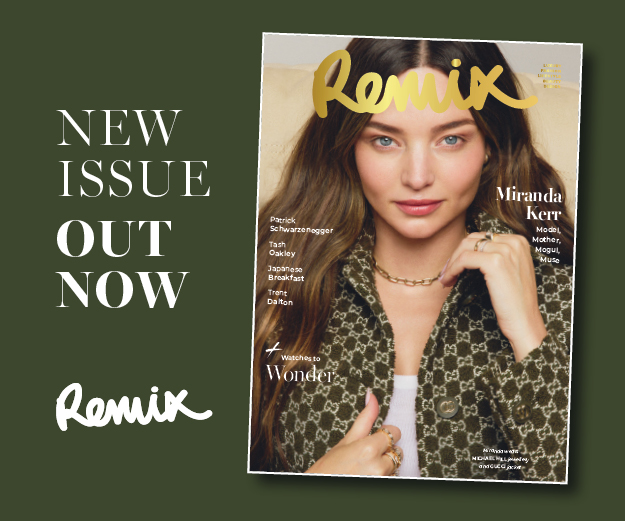Run Your Way: Remix chats with three New Balance ambassadors & world-class athletes on their running journeys
Running isn’t just a workout, it’s a moment of escape. For some, it’s a rare moment of quiet away from the demands of work and family. For others, it’s a priority for wellbeing. But no matter how or why you run, you should never have to compromise on style. And of course, with New Balance’s FuelCell Rebel v5, pounding the pavement just got a whole lot cooler. Featherlight, bold, and built for speed, this is the kind of fashion-forward shoe that makes you want to lace up and pop on your headphones, whether you're chasing a new personal best or just clearing your head after a long day.
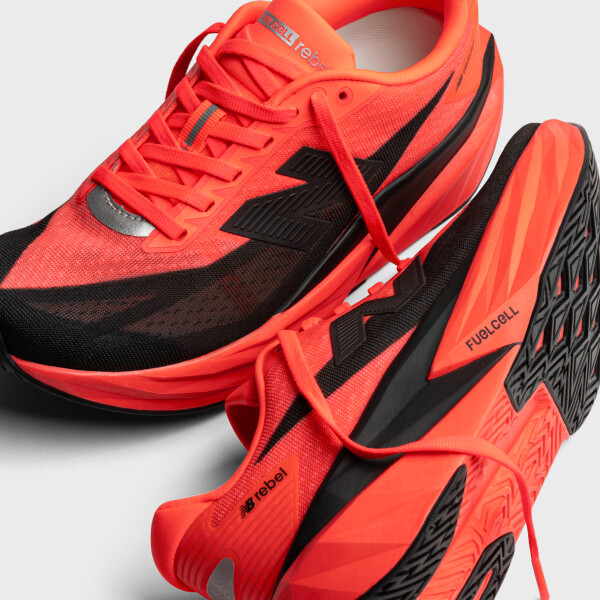
At first glance, the Rebel v5 stands out from the crowd—and that’s exactly the point. With a sleek silhouette, bold colour blocking, and a modern edge, this shoe is made for runners who want to look as sharp as they feel. But it’s what’s underneath that really counts. The ultra-lightweight upper combines breathable mesh with New Balance’s FANTOMFIT bonded support system, delivering a snug, locked-in feel without sacrificing comfort. The Rebel v5 features a PEBA-blended FuelCell midsole—a powerhouse of responsiveness and energy return. Whether you're smashing out intervals or stretching your legs on an easy Sunday 5K, the powerful technology in this shoe springs you forward with every stride, making each run feel a little more effortless, and a lot more fun.
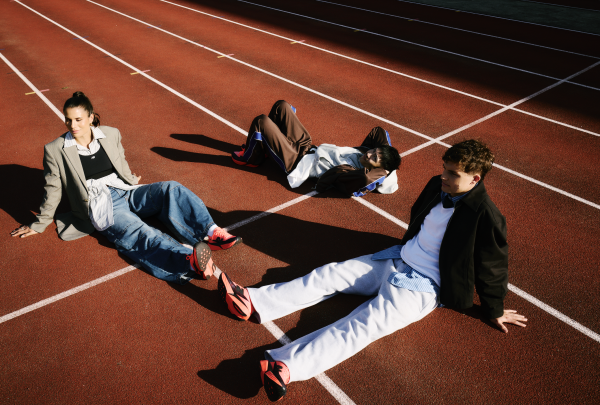
Part of New Balance’s Run Your Way movement, the FuelCell Rebel v5 is proof that there’s no one-size-fits-all approach to running—and it’s the kind of shoe that doesn’t impose one. And in the ultimate wear test, Remix invited Olympic track and field sprinter, Zoe Hobbs, Auckland FC right back, Callan Elliot and 445 run club leader, Travis Ovalsen, to try out the new kicks, proving once and for all that endurance and style don’t have to be mutually exclusive. In an exclusive interview with Features & Lifestyle Editor, Nina the athletes open up about their running journeys, what drives them to succeed and why New Balance footwear supports them through it all.
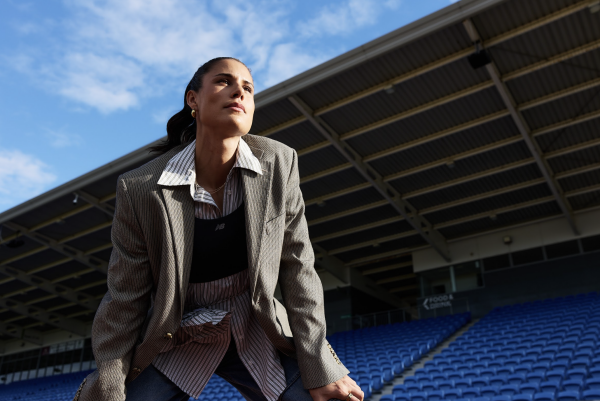
Olympic track and field sprinter, Zoe Hobbs
What first drew you to running, and when did you realise it was more than just a sport for you?
I was very young when I first got into running. Like many people, it’s one of those sports that’s so accessible, with something for everyone. Naturally, my parents took my brother and me to the local athletics club, and that’s where my love for athletics, and running in particular, began. I’ve always had an innate competitive drive, which I’ll admit has really served me well in the sport, especially now that I pursue it professionally. I won’t lie though, I used to love beating the boys at school or at the club when I was growing up - proving them wrong in a way! Running is one of those sports where progress is easily measurable, and that can become addictive. Whether it's bettering my own times, chasing records, or pushing myself to get the best out of myself, the tangible progress is very motivating to me.
But beyond the competition, running has brought so much value to my life. It’s helped shape much of who I am today, teaching me valuable life lessons and helping me grow as a person. Even from the very beginning, I remember how the club had such a strong sense of community. We became close with other families, meeting every Thursday for club nights, attending ribbon days on weekends, and travelling together for the Colgate Games. Those were some of my most memorable and fun moments in my childhood, and I think that sense of community truly cemented my love for the sport.
Fast forward to today, and I’m incredibly grateful for the people, connections, and experiences this sport has given me. It was never a given that I would make it this far, but I’m proud of the young girl who stuck with it and proved she could do it.
What mental challenges have you faced during your running career, and how did you push through them?
Mental challenges have been a big part of my running journey, especially dealing with doubt — both from others and, at times, within myself. I remember how intimidating and scary it felt to voice my dream of competing in the 100m at the Olympics, when it seemed so out there. I distinctly recall sitting in a meeting with graphs and statistics put in front of me where it was suggested I should try hurdles or the 200m as I might have a better chance of qualifying in those events compared to the 100m. But I stuck with the 100m because it was my favourite event. I love the challenge, my training environment, and the sport, and that was enough to keep me pursuing it. I would say one of my biggest strengths is my pragmatism. When I missed selection for the Olympics in 2021, despite equalling the New Zealand 100m record twice that season, I had to lean heavily on that mindset. In my last push for the Tokyo Olympics, I was in Australia, having just simultaneously finished my final exam for my BSc in Human Nutrition. When it became clear that dream had slipped out of reach, it was tough. I felt frustrated, sad, and questioned whether I was good enough, or if I would ever make it. Questions from athletes, coaches and peers asking if I was going to the Olympics only deepened that feeling.
But ultimately, I came back to why I started this sport in the first place: because I love it. I made it my mission to refocus on the parts I genuinely enjoy - training, competing, my training group and environment. After 2021, each year has felt like a steady, consistent climb, with performances improving, and belief and confidence gradually building too. Over time, the self-doubt that once held me back began to fade. And now, standing here as an Olympian, I have goals that younger me could have never even imagined.
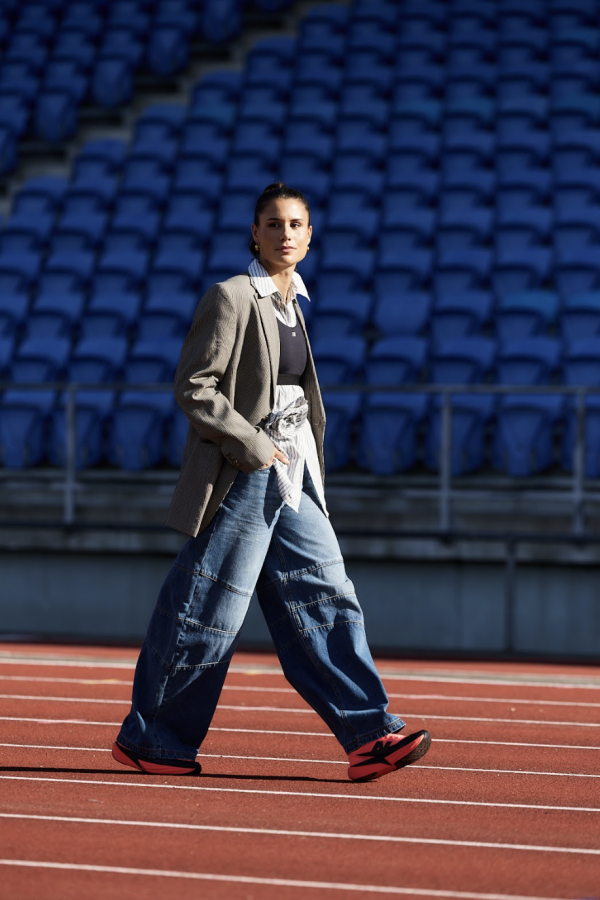
What are the non-negotiables in your training routine, especially when it comes to footwear and recovery?
A thorough warm-up is non-negotiable for me in my training routine. If you know me, you’ll know just how long I take to warm up – some of my peers even joke about it! But for me, it’s that crucial time before training where I can assess how I’m feeling, listen to my body, and ensure everything is ready to go. It’s not just about getting the body warm; I use that time to focus on ironing out any tight spots and fine-tuning how I show up for each session. My warm-up generally follows the same routine day in and day out, but I adapt it based on how I’m feeling, emphasising specific areas that need more attention. For an 11-second race, I’ll be warming up for roughly 1.5 hours – all for 11 seconds of performance. While that amount of time may not be necessary for endurance running, for high-intensity sprints like mine, it’s critical to ensure my body is fully prepared. This process helps me avoid injury and ensures I’m fully prepared to get the most out of each session.
When it comes to footwear, I’m obsessed with the New Balance FuelCell SuperComp Pacer v2 for my sneaker. This shoe features a carbon plate, which is ideal for the nature of my training – lots of drills in warm-ups, strides / sprints in flats, hopping and plyo work. I find this shoe super responsive and fast because of the carbon plate. Sometimes it feels like cheating being in a carbon shoe with how much quicker and responsive it makes training feel. Although I love being in a carbon plate, I usually try to switch it up with a non-carbon shoe like the New Balance FuelCell Rebel v4. Roughly four times per week, I’m in spikes for my sprint sessions. I’ve been fortunate to meet the New Balance team in Boston on a few occasions now to do spike testing in the lab, where I’ve provided direct insight, feedback and shoe testing data which helps feed into the spike’s development. It's been awesome to be involved in that, hopefully helping to further evolve and further develop an already fast shoe!
How important is rest and recovery as part of being a high-performance athlete?
Very important. I would even go as far to say that as a sprinter rest and recovery is just as important, if not more important. If you're expected to show up and give maximum efforts in training with the high intensity loading we do, how are you going to push the needle, adapt and improve if you aren't recovering. Good sleep and good nutrition = highest importance on the recovery front.
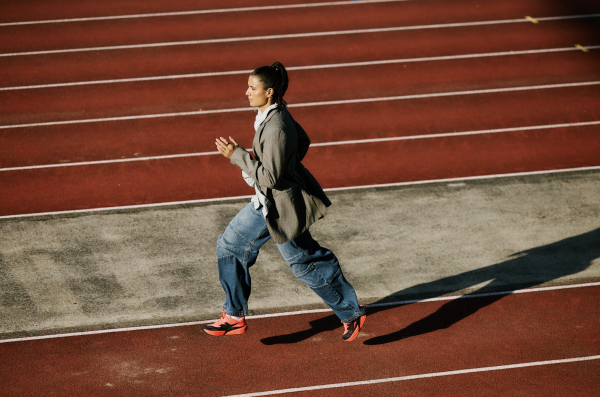
What are your go-to tips for staying consistent with a running routine?
Staying consistent with a running routine is about making it non-negotiable for me. It’s not even up for debate – no choice, just do. Of course, I’m human, so there are days when I feel tired, sore, sluggish, and unmotivated, sometimes all at once. But I’ve learned that the hardest part is often just getting out the door and I remind myself how great I feel after a session. It’s a simple but effective motivator.
Each year, I have a big event on the calendar that I’m building up to and aiming to peak for. Having that target competition or goal in place gives real purpose to my training, and everything is planned and structured around it. So, I’d say that having an event or goal to work towards helps keep me consistent with my routine. That said, I also make sure there are stepping-stone competitions and little goals along the way, especially if the end goal feels far in sight. These smaller milestones give me short-term objectives to work towards, which definitely helps with maintaining consistency.
Giving purpose and a small focus to each session also helps. For example, I ask myself before each session: “What’s one small detail or technical aspect I can focus on today to help me improve as an athlete / runner?” When I have specific focuses, it’s really rewarding to see progress over time as those adjustments bleed into my natural form of running.
Lastly, I’ve found that training with like-minded peers makes it more enjoyable. Having people to push each other and keep each other accountable is a great motivator.
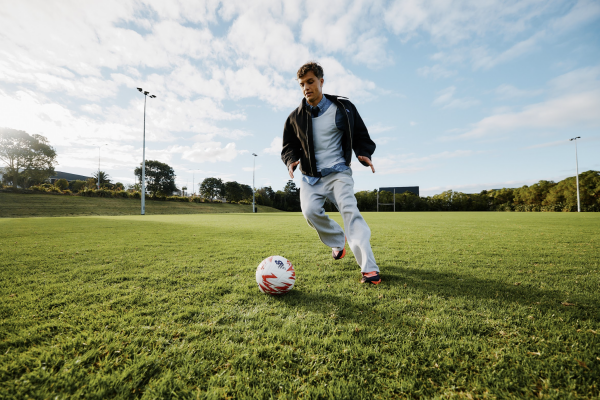
Auckland FC right back, Callan Elliot
As a professional footballer, how does running fit into your training and match prep?
Very rarely will I go for a standard run during season. As a footballer we aren’t constantly running during a game so this sort of running wouldn’t be the most effective training. During a training week, we as a team will have individualised running once a week and the rest of our running will be done through footballing games.
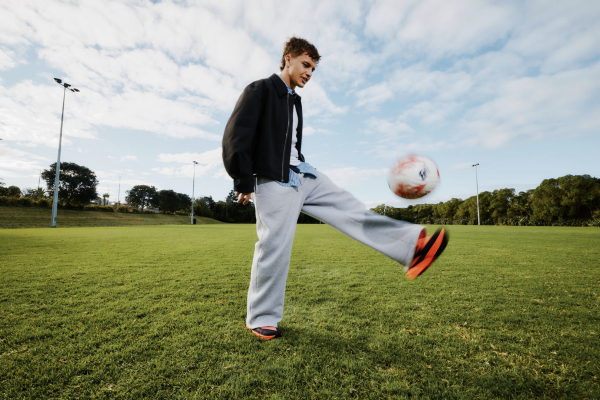
What types of running do you incorporate into your training (e.g., sprints, endurance) and how do they support your game?
Running is a huge part of being a footballer. Most of the time on the pitch that is all you’re doing. With a higher threshold of fitness it also allows you to think more clearly and execute scenarios more effectively, that’s why at Auckland FC we pride ourselves on being the fittest team. Our running consists of higher intensity within a smaller distance as this is the type of running that simulates a game.
What mental challenges have you faced during your sporting career, and how did you push through them?
The biggest mental challenge in my career was being without a team for 7 months. Being a footballer and being in that environment constantly it starts to become all you know. Without that normality and no income it started to affect me massively. All I could do was to continue training as much I could as I knew down the road another opportunity would come, I just didn’t know how long that road would be. I eventually signed for Motherwell in Scotland and then moved on to Auckland FC where in the happiest I’ve ever been in my career.
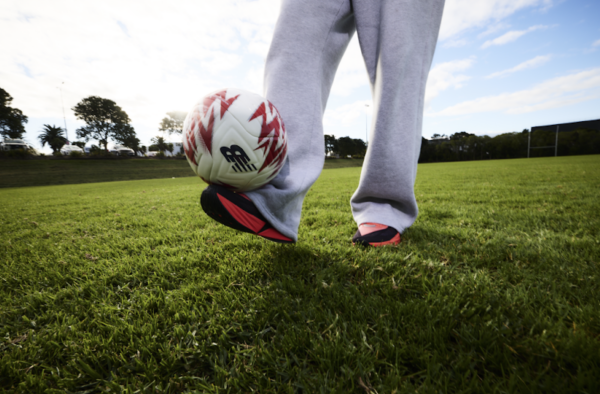
What are the non-negotiables in your training routine, especially when it comes to footwear and recovery?
A non negotiable for me is always giving it your all during training. As an athlete you're not always turning up to training feeling 100%, whether that’s physically or mentally, especially if you know the training session your coming into your about to be worked to your absolute peak. For me it’s important to overcome those feelings and give it everything as that’s when you become better. It’s easy to work hard when everything is perfect but where you truely become better is when you’re able to work hard when your mind is telling otherwise.
How important is rest and recovery as part of being a high performance athlete?
Recovery is one of the most important things as an athlete. Small turn around times means you need to be feeling 100% as quick as possible. There’s no such thing as too much recovery and we are constantly trying to get our body feeling as best it can. This consists of ice baths, saunas, compression boots, stretching and most importantly sleep.
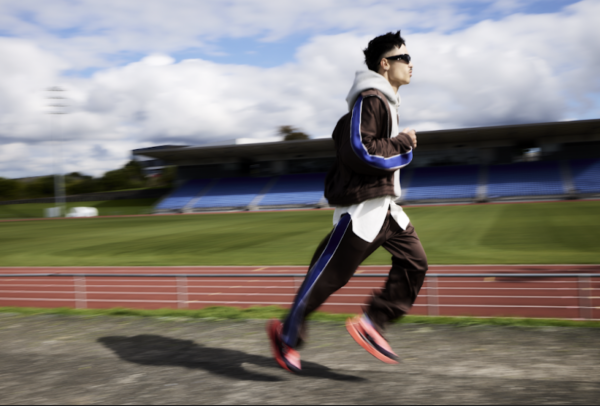
445 run club leader, Travis Ovalsen
As run club leader, how have you seen running change the lives of people who join your club?
As a leader and a role model within my club, I’ve seen a massive shift in the runners mentality of people who come to 445 run club, knowing that people are of all ages have all different abilities and levels of fitness which allows everyone to be involved.
I’ve also seen a huge increase in people signing up to events and achieving massive goals, which they never thought they could do, which is so amazing to see and one of the highlights and what fills my cup, and why I love community - which is to see people achieving cool things and to get them out of their comfort zones!
For someone completely new to running, what’s the best way to build up fitness without burning out?
Get a structured plan and start with small goals of running your first 5km being work up to that. Do your strength work in the gym as both really do correlate. Be consistent, running is just like anything else the more you do it the better you will be, but within reason too, something I’ve learned was when I first started out, I would burnout all the time, so my advice is your body knows best and take your rest days we tend to get caught up in social media and seeing everyone doing cool things and think we can be like them, but actually it’s our own running journey, so be proud of your progress and understand yourself and what works for you.
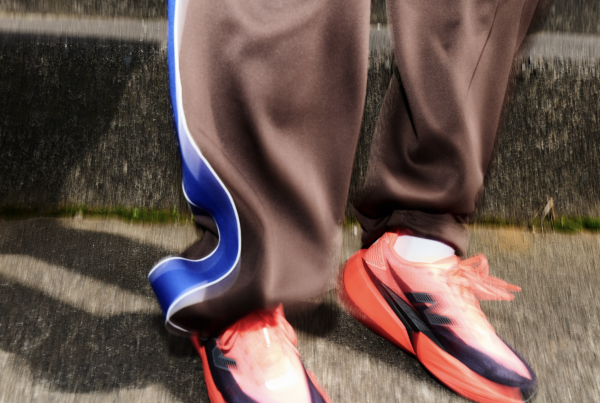
Did you follow a particular plan or routine when you first started running? If so, what worked well for you?
No I didn’t until I got a coach which was Liam Bird, he really understood me with how I worked and how to fit in runs within my busy schedule, he had the experience to tell me when too much was too much and what workouts I needed to do to get faster. What worked for me was setting a target race and doing a build up to that race to get me ready for that event. My best advice? Set some running goals then base your training around those target goals.
What mental challenges did you face when you started running, and how did you push through them?
Some mental barriers I’ve faced in my running journey was definitely marathon training, it is a mental slog and really takes a certain person to go through with a marathon block training then completing the race itself. I take my hat off to anyone who has, as it is no easy feat. The marathon will test you in many ways, I was once told it’s not the destination (the race) but it’s the journey (marathon training) that is important. Meaning that all the training you do you will look back on it and see the countless hours, the miles you do each week when it’s early before work or late after work, when it’s raining or sunny. It’s the mental challenge of doing it whether you’re sore or tired, that was where the real growth happened for me was gaining that discipline to push through and get to that start line. Then when you got there it was the relief of now being able to enjoy your new gained fitness and to enjoy this environment and experience.
Another one was nutrition, understanding that your body needs to be fuelled right to be able to do the training. It was hard for me and is one of the biggest things I struggled with and lead to many burnouts, so this is still something I’m striving to work on.
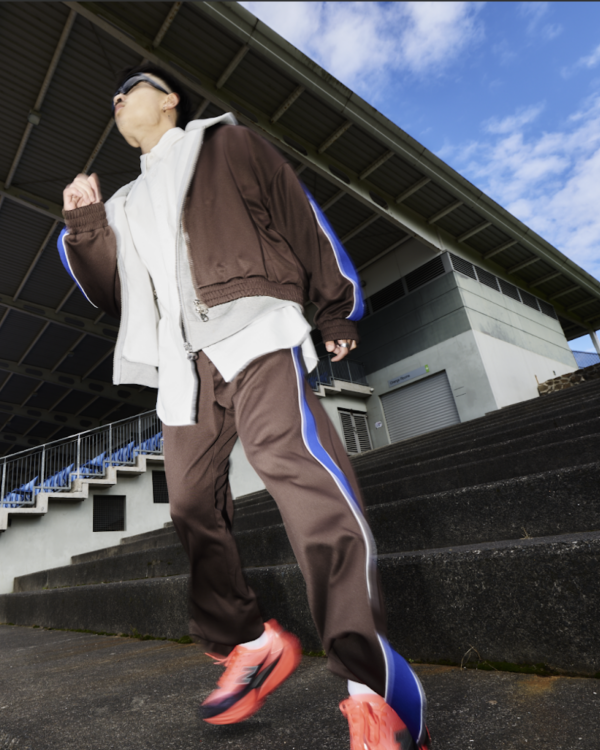
What are your go-to tips for staying consistent with a running routine?
Some tips I have for staying consistent with running are, plan your runs with friends or local communities such as run clubs, these will help you stay accountable as you don’t want to let your friends down. Another is plan your run around finishing where you can get a cheeky treat afterwards, as this gives you a little motivation to get it done.
PHOTOGRAPHER: CHRIS SISARICH
STYLIST: MAKAIRA LEE
HAIR & MAKEUP: LIZ HYUN
CREATIVE DIRECTION: NINA MOLLOY
PHOTOGRAPHY ASSISTANT: OLIVER CRAWFORD
WITH THANKS TO: THE TRUSTS ARENA


